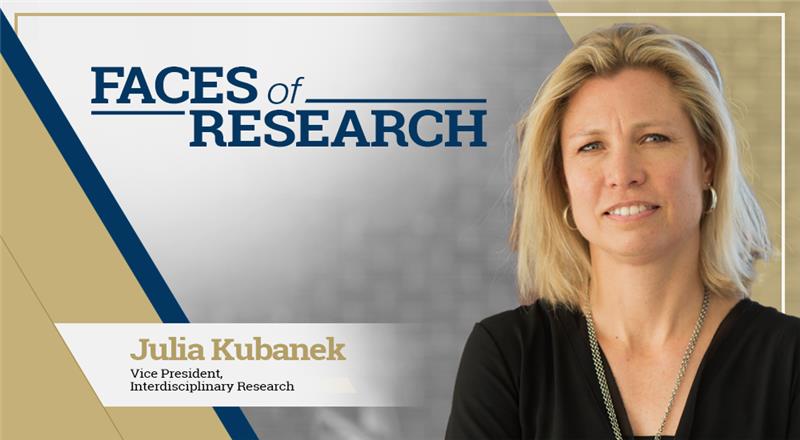
Jul 08, 2021 - Atlanta, GA
Meet Julia Kubanek, Vice President of Interdisciplinary Research at Georgia Tech.
Kubanek oversees all interdisciplinary research activities including the Interdisciplinary Research Institutes (IRIs), Interdisciplinary Research Centers, the Pediatric Technology Center, and the Georgia Center for Medical Innovation.
What is your field of expertise and why did you choose it?
My students and I ask how living organisms communicate and interact with each other using chemistry as a language of life. We explore molecules produced by microbes, plants, and animals as words in this language, delivering messages like “don’t eat me! I taste terrible” or “yes, I’m one of your kind! mate with me” or “the surface of my body is a terrible place to land, you won’t grow well on top of me." Humans know these molecules more as antibiotics, toxins, and strange smells – but to the living organisms that produce them and those sensing these molecules in natural environments, they are an essential part of survival and reproduction.
We do most of our research in marine systems, discovering new chemical messages that affect the health of the oceans, which can also be leveraged by scientists as new medicines and solutions to environmental challenges. Some of the environmental challenges we focus on are harmful algal blooms and biofuel production. I chose this field of research because I love wilderness and am fascinated by the diversity of species on earth – including the capacity of diverse organisms to produce unusual chemicals.
What makes the way the IRIs enables campus research unique?
The IRIs provide an intellectual home for researchers who have interests in common but different backgrounds and expertise. Each IRI has members from all over our campus and we each bring a different perspective on how to get research done. We find commonality on what kinds of scientific and societal questions need to be answered and then pool our various expertise to answer those questions, through joint projects, centers, training programs, and outreach activities.
What couldn’t have happened without Georgia Tech's IRIs?
After we bring samples from the field into the lab, my research is dependent on specialized equipment, not all of which we have in our own lab. In fact, I’m glad we don’t have all that equipment in our lab because I wouldn’t be able to maintain it all or learn everything about each instrument. For my group’s research, the IRI core facilities and their personnel have been essential to gathering data from many kinds of specialized instrumentation. My students and postdocs get hands-on experience with these instruments which helps build their careers. The diverse core facilities of the IRIs and the expertise of their staff enable us to apply many kinds of experiments to solve each scientific question, rather than being focused only on one technical capability.
What impact is your interdisciplinary research having on the world?
My group’s research has enabled the discovery of several new potential drugs, including molecules that inhibit pathogens like the malaria parasite, drug-resistant bacteria, and coronaviruses. The IRIs have also helped us figure out the mechanisms by which some of these drugs work. Involvement in the IRIs has also enabled us to better understand why and how harmful algal blooms become more toxic under certain environmental conditions, which has implications for seafood safety.
What do you like to do in your spare time when you are not working on your research or teaching?
I love to hike and swim in wild places. These days, I am spending some of my time around the Smoky Mountains where I seek out wildflowers I have not seen before and to hope that I’ll get to see a bear (but not a rattlesnake). I have seen both in the last year, and the experience was simultaneously thrilling and frightening. I am an occasional volunteer with Trees Atlanta, a frequent jogger in my neighborhood, and an eager (but unskilled) yoga practitioner. My yoga teachers say there is no such thing as being bad at yoga, but I think they are just being nice to me.